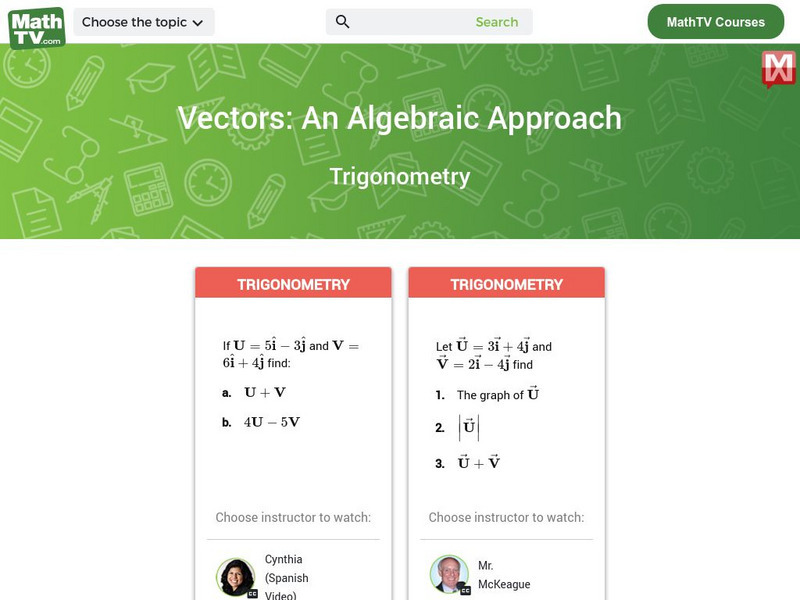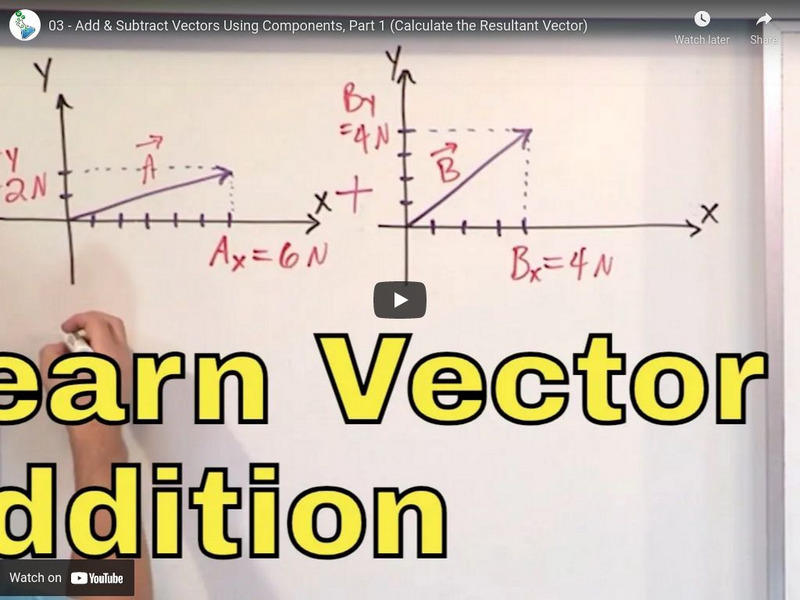3Blue1Brown
Linear Combinations, Span, and Basis Vectors | Essence of Linear Algebra, Chapter 2
What does it mean for two vectors to be linearly independent? The resource presents the basics of basis vectors and linear combinations. The third video in the 15-part series provides a definition of linear independence in terms of the...
Corbett Maths
Column Vectors
Column right! Using visual representations, a short video introduces the concept of column vectors. Next, the resource shows how adding two vectors end-to-end is simplified by adding the components in the column vector. The presentation...
Corbett Maths
Vectors
Come in on a vector. A video introduces vector notation and basic definitions. Given a shortened version of representing the vector, the presenter shows how to add vectors algebraically. Using parallelograms and trapezoids, the resource...
3Blue1Brown
Vectors, What Even Are They? | Essence of Linear Algebra, Chapter 1
Take a look at vectors as geometric objects and then as an algebraic concept. The second video in a series of 15 introduces the vector using three perspectives: the physics, computer science, and mathematical. The resource shows the...
Khan Academy
Khan Academy: Linear Algebra: Defining the Angle Between Vectors
Video uses the vector triangle inequality and the law of cosines to demonstrate and prove the definition of the angle between vectors. Uses the definition of the angle between vectors to define perpendicular vectors. Shows that the dot...
Khan Academy
Khan Academy: Linear Algebra: Relationship Between Cross Product and Angle Sin
Video proving that the magnitude of the cross product of two vectors is equal to the product of their magnitudes and the sine of the angle between them. [18:09]
Khan Academy
Khan Academy: Linear Algebra: Dot and Cross Product Comparison/intuition
Video first reviews how to find the angle between two vectors, as well as restating the relationship between the cross product and the sine of that angle. Then gives an intuition of what the dot product and the cross product represent....
Math TV
Math tv.com: Vectors: An Algebraic Approach
The video tutorial investigates vectors from an algebraic point of view. A worksheet consisting of practice problems and solutions is included to check for understanding of the concept. In the left hand menu, click on Trigonometry,...
Khan Academy
Khan Academy: Linear Algebra: Defining the Angle Between Vectors
Video shows using the vector triangle inequality and the law of cosines to demonstrate and prove the definition of the angle between vectors. Uses the definition of the angle between vectors to define perpendicular vectors. Shows that...
Khan Academy
Khan Academy: Linear Algebra: Vector Dot Product and Vector Length
Video first reviews vector addition and multiplying by a scalar multiple. Gives notation for dot product and shows example of calculating the dot product of vectors. Then gives the formula for vector length and gives examples of using...
Khan Academy
Khan Academy: Vector Dot Product and Vector Length
Definitions of the vector dot product and vector lengthVideo first reviews vector addition and multiplying by a scalar multiple. Gives notation for dot product and shows example of calculating the dot product of vectors.
Sophia Learning
Sophia: Introduction to Vectors & Scalars
Learn about vectors and scalars in physics, and find out how they are related to distance and displacement. [5:19]
Sophia Learning
Sophia: The Parallelogram Rule
A video presentation explaining the parallelogram rule for combining non-parallel vectors. [4:54]
Khan Academy
Khan Academy: Linear Transformation Examples: Unit Vectors
What unit vectors are and how to construct them.
PatrickJMT
Patrick Jmt: An Introduction to Vectors Part 1
Tutorial provides an introduction to vectors including magnitude, direction, length, and component form. [4:45]
Khan Academy
Khan Academy: Vector Addition & Magnitude: Magnitude of Vector Sums
Explains some interesting properties of the magnitude of vector sums. [5:30]
Other
Math Tutor Dvd: Add & Subtract Vectors Using Components, Part 1
Video tutorial provides step by step examples that show how to add vectors using the x-component and y-components of the vector. [27:08]
PatrickJMT
Patrick Jmt: Vectors: Finding Magnitude or Length
Easy to understand tutorial gives the formula and provides a couple examples of finding the magnitude, or length, or a vector. [3:32]
Khan Academy
Khan Academy: Adding Vectors Algebraically & Graphically
To add vectors, we add the corresponding components from each vector. See this concrete example. There's also a nice graphical way to add vectors, and the two ways will always result in the same vector.
Khan Academy
Khan Academy: Adding & Subtracting Vectors
Sal shows how to add vectors by adding their components, then explains the intuition behind adding vectors using a graph.
Khan Academy
Khan Academy: Adding Vectors in Magnitude & Direction Form (2 of 2)
Watch Sal finish the problem he started in part 1 by converting the sum back to magnitude and direction form.
Khan Academy
Khan Academy: Adding Vectors in Magnitude & Direction Form (1 of 2)
Watch Sal add two vectors given in magnitude and direction form by breaking them down into components first.
Khan Academy
Khan Academy: Calculating Dot and Cross Products With Unit Vector Notation
Calculating the dot and cross products when vectors are presented in their x, y, and z (or i, j, and k) components. [9:46]
Sophia Learning
Sophia: Finding the Angle Between Two Vectors: Lesson 2
This lesson explains how to find the angle between two vectors. It is 2 of 7 in the series titled "Finding the Angle Between Two Vectors."























